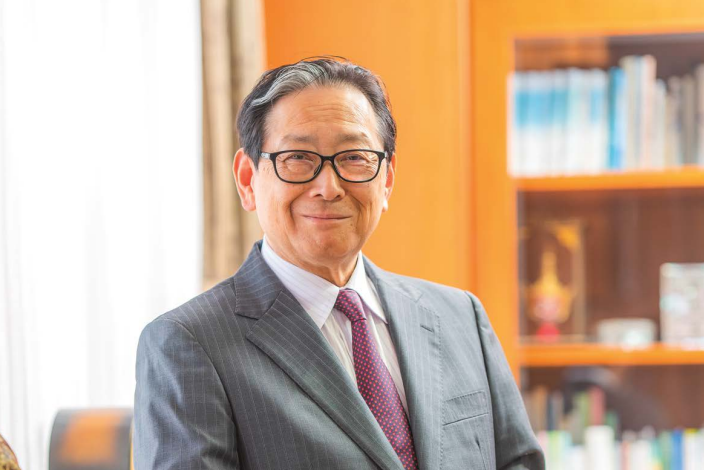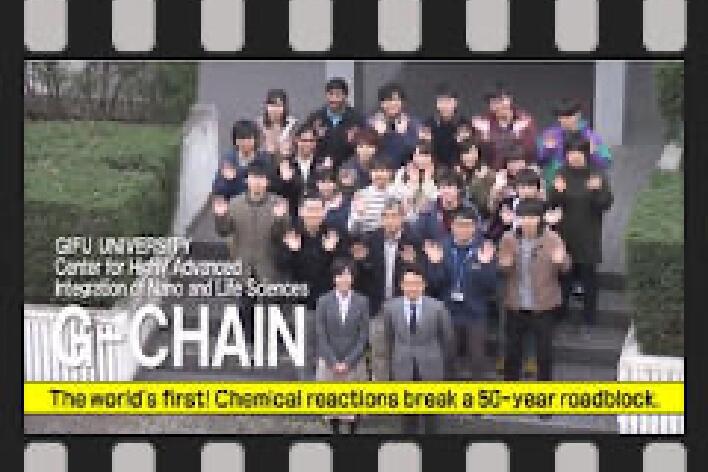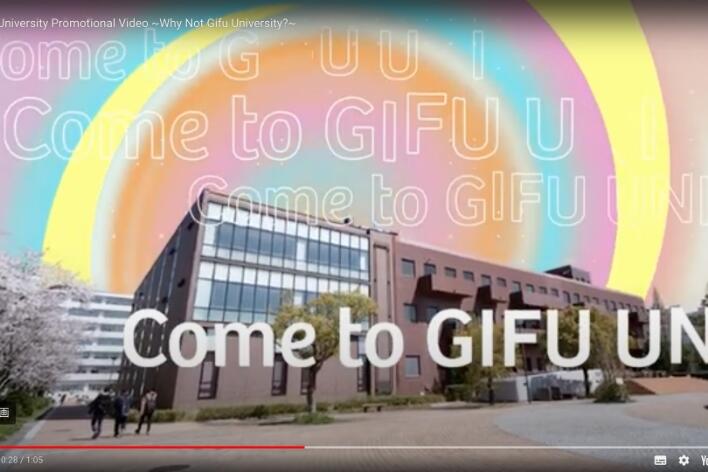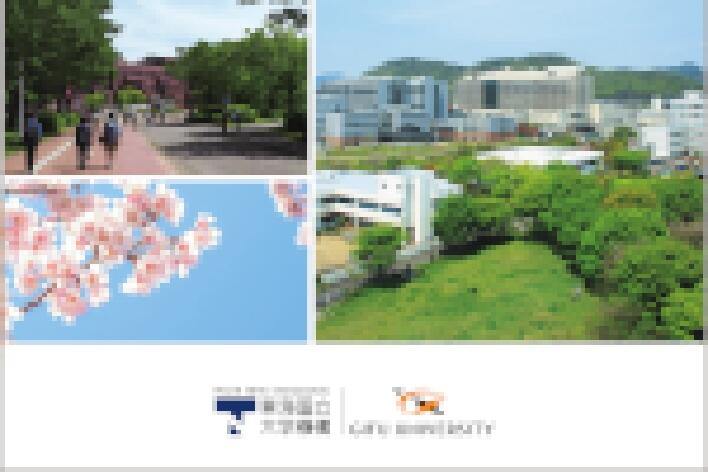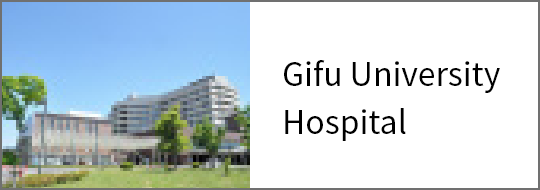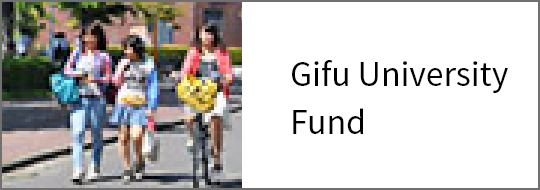President's Address: AY 2024 Entrance Ceremony
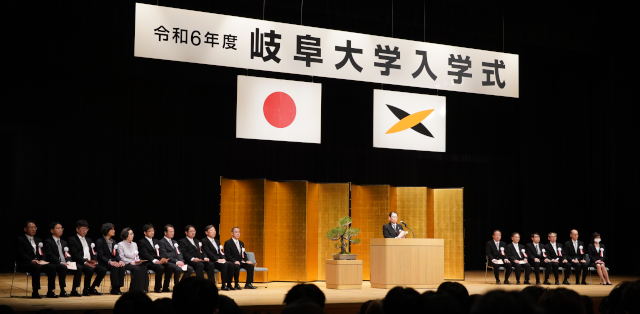
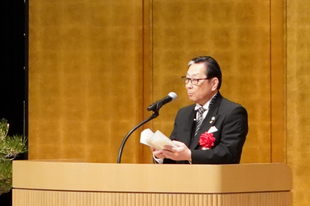 To all our new students, congratulations on your admission to Gifu University. We are extremely pleased to have 1,326 new undergraduate students and 668 graduate students join our campus this year. I am grateful to share this new beginning with all of you, as we commence a new chapter in our lives.
To all our new students, congratulations on your admission to Gifu University. We are extremely pleased to have 1,326 new undergraduate students and 668 graduate students join our campus this year. I am grateful to share this new beginning with all of you, as we commence a new chapter in our lives.
For over three years since the outbreak of the pandemic in early 2020, we have faced numerous restrictions in our daily lives. Additionally, people worldwide have been profoundly affected by a series of unpredictable events and disasters, including climate change, Russia's military action in Ukraine, and the ongoing humanitarian crisis happening in Gaza. However, even this unprecedented combination of adversities has not broken your ardent determination to work hard and enter a new place of study at Gifu University. I ensure you that you have made the right choice regarding your academic direction by choosing this university. I would also like to take this opportunity to show my appreciation to everyone, including your guardians and supervisors, who have supported you at every step of the way. Chancellor MATSUO Seiichi of the Tokai National Higher Education and Research System (THERS) is also present to wish you the best in your exploration of new academic goals and endeavors.
Until last year, the entrance ceremony was divided into three parts due to precautions against the spread of COVID 19. From the AY 2024, we will be conducting the entrance ceremony in two parts, celebrating the admissions of undergraduate students and graduate students separately. After your entrance ceremony, we will host you in a welcome ceremony.
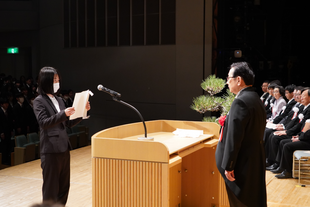 Now, I would like to offer some brief insights into Gifu University. As a comprehensive general university deeply rooted in the local community, Gifu University consists of six faculties: Education, Applied Biological Sciences, Regional Studies, Engineering, Medicine, and the School of Social System Management. Although the University was officially founded in 1949, our institution's history can be traced back to the founding of Gifu Normal School in 1873, making it the fourth oldest university in Japan. The establishment of Gifu Normal School was followed by the Faculty of Applied Biological Sciences in 1923, which celebrated its 100th anniversary last year. Both the Faculty of Engineering and the School of Medicine were founded in the 1940s. However, I must add that Gifu University Hospital has roots in an institution formed by the amalgamation of Gifu Public Hospital with a medical school and built in Tsukasa Town, Gifu City, in 1875.
Now, I would like to offer some brief insights into Gifu University. As a comprehensive general university deeply rooted in the local community, Gifu University consists of six faculties: Education, Applied Biological Sciences, Regional Studies, Engineering, Medicine, and the School of Social System Management. Although the University was officially founded in 1949, our institution's history can be traced back to the founding of Gifu Normal School in 1873, making it the fourth oldest university in Japan. The establishment of Gifu Normal School was followed by the Faculty of Applied Biological Sciences in 1923, which celebrated its 100th anniversary last year. Both the Faculty of Engineering and the School of Medicine were founded in the 1940s. However, I must add that Gifu University Hospital has roots in an institution formed by the amalgamation of Gifu Public Hospital with a medical school and built in Tsukasa Town, Gifu City, in 1875.
Today, we are anticipating the emergence of a 'smart society,' where big data transactions, the development of generative artificial intelligence (A.I.), the acceleration of robotic technologies, and the spread of the 'Internet of Things' will play pivotal roles in our society. It will in no doubt impact every aspect of our daily lives. In this 'smart society,' as our community evolves into an even more knowledge-based society, everything - including our personal information- amasses, forming big data. This big data is considered essential for creating new values in the future. Amidst the ongoing forces of globalization, the constant generation of new knowledge fuels the growth of our society.
Against the backdrop of ongoing digital transformation, the establishment of Japan's first academic integration initiative, known as the 'Tokai National Higher Education and Research System' (THERS), commenced in April 2020. THERS is facilitating closer and deeper collaboration across a broader spectrum of joint educational and research endeavors between Nagoya and Gifu universities. Aligned with THERS' overarching mission- "Make New Standards for The Public - As a 'Commons of Knowledge and Innovation,' we pursue a new form of university and contribute to the advancement of our community and humanity," Gifu University's vision and strategic goals include the following: 'Rise to become a top-tier regional core university in Japan' 'Develop human resources excelling in 'Learning, Exploring, and Contributing,' and 'Create innovations through collaboration with local governments and private enterprises to address regional challenges.'
Furthermore, under our newly created model for value-creation, "Migration, Laboratory, Innovation, Education," Gifu University, together with our stakeholders, are striving to advance the five objectives of 'Creation of Businesses and Community-Building,' 'Product Manufacturing,' 'Food Manufacturing,' 'Development of New Medical Systems,' and 'Human Resource Developments.' We believe that achieving these five objectives will enhance Gifu University's accessibility and appeal to both the local community and a global audience, transforming the university in sustainable and research-oriented ways for years to come.
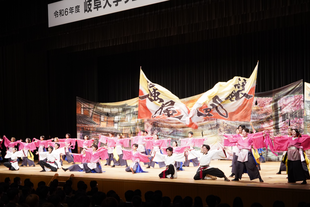
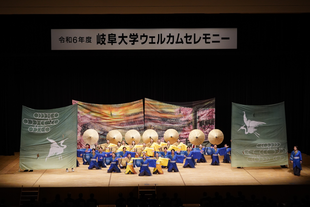
The unique and diverse academic and research initiatives that Gifu University continues to advance are taught and supervised by our outstanding team of academic staff whose world-class achievements and contributions are well recognized in their respective global academic communities. Gifu University students can further their learning by taking advantage of various interdisciplinary courses offered by different faculties and schools, to acquire the knowledge and skills necessary to achieve their goals. For example, on- and off-campus courses offered by Zenkyo General Education, or other diverse educational curricula offered by THERS, provide ample opportunities to gain wider academic and research perspectives. Gifu University's academic support and assistance does not end there. We continue to provide graduates with the support they need even after graduation, whichever career path they pursue, and whether they decide, as fully fledged members of society, to enter the workforce or seek an academic career as a researcher.
Next, I would like to share the major achievements of Gifu University in the four years since the establishment of THERS in 2020. New educational programs introduced by Academic Central1 include joint classes for students of both Gifu and Nagoya universities under Gifu University's Campus-Wide Core Curriculum focusing on English, mathematical and data science, and A.I. Our credit transfer system and shared use of laboratories and facilities between students from both universities have expanded significantly. Moreover, due to the relentless efforts of all involved, we have been able to offer waivers for university tuition and financial support to PhD students. These initiatives are designed to allow students to focus on their academic pursuits and objectives. The implementation of the innovative 'Student Status System' enables students to assess their own progress and accomplishments via their smartphones. It's worth noting that Gifu University is the pioneering institution in Japan to adopt this system, ensuring transparency and visibility of students' academic achievements for all.
At Gifu University, a significant number of international students and researchers are studying and engaging in research activities on campus. To date, the University has 49 foreign partner universities in countries ranging across Europe, North America, Asia, and Oceania. Various faculties offer strong support to students who wish to study abroad whilst at university. In addition, Joint Degree Programs (four international master's and PhD programs) with the Indian Institute of Technology Guwahati and the National University of Malaysia were launched in April 2019 to accelerate the internationalization and enhancement of educational and research capabilities among the three universities. Today, our nation is at an important crossroads of urgently expanding our global reach, and to fulfill this crucial mission, robust interactive exchanges among students, scholars, and citizens are indispensable. We are hopeful that all Gifu University students fully utilize our study abroad support programs to explore and experience the world.
In the sphere of research, we place special emphasis on advancing three fields: 'Life Sciences,' 'Product Manufacturing,' and 'Environment and Energy.' These fields have great potential to help us resolve numerous socioeconomic challenges and address the risks humanity faces today. THERS' six core directives, bolstered by the respective advantages of Gifu and Nagoya universities, are expected to continue expanding as they consistently advance THERS and its key components: 'Institute for Glyco-core Research (iGCORE),' 'Center for One Medicine Innovative Translational Research (COMIT),' 'Intelligent Production Technology Research & Development Center for Aerospace,' 'Center for Research, Education, and Development for Healthcare Life Design (C-REX),' 'Low Temperature Plasma Comprehensive Research Center,' and 'Quantum-Based Frontier Research Hub for Industry Development (Q-BReD).'
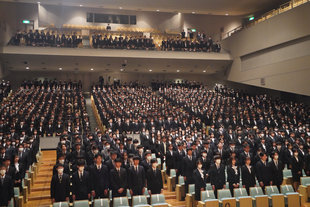 Starting from today, you are a full member of this Gifu University community and eligible adults with the future, and the present, of this country in your hands. Your approach to learning will reflect on the level of self-responsibility and self-determination you take in your life. Think things through before initiating any actions and never waver in attaining the goals you set for yourself.
Starting from today, you are a full member of this Gifu University community and eligible adults with the future, and the present, of this country in your hands. Your approach to learning will reflect on the level of self-responsibility and self-determination you take in your life. Think things through before initiating any actions and never waver in attaining the goals you set for yourself.
A Japanese educator, FUKUZAWA Yukichi (1835 - 1901), who founded Keio University in Tokyo in 1858, is well-known for his motto 'Itan to Sendou.' (heterodoxy and leadership). This motto exemplifies Fukuzawa's call for intellectual courage, innovation, and societal transformation. It invites people to challenge the status quo and lead Japan into a new era of enlightenment.
In the field of gastrointestinal surgery, which is my specialty as a medical doctor, laparoscopic surgery and robot arm-assisted operations are standard practice today, reducing the physical trauma of patients. In this procedure, a surgeon creates a tiny incision in a patient's abdomen, through which a laparoscope is inserted and used to perform the entire operation. Over 100 years ago, Fukuzawa wrote the following passage in his book: "A time will definitely come when a patient can quickly recover from surgery using an endoscope or laparoscope." At that time, even open abdominal surgery was not yet an established practice. His insight may have been considered 'heterodoxy' by his contemporaries, but it ultimately served as a guiding light, leading the medical community toward creativity and innovation. 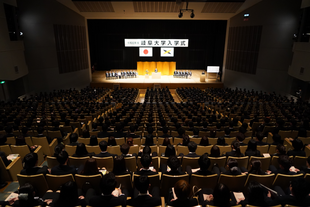 Let me close by wishing you a campus life of fulfillment in all respects: studying, training, making friends, discussing life, or seeking the truth. Take time out to explore and appreciate the beautiful natural surroundings on campus. Stand firm on the moral high ground, armed with integrated knowledge and wisdom, embrace the status of 'heterodoxy' in this time, and lead the world in the years ahead. We are eager to support you and guide you in realizing your hopes, dreams, and aspirations. I welcome you all and request that you join us in endeavoring to make your university years the best ever.
Let me close by wishing you a campus life of fulfillment in all respects: studying, training, making friends, discussing life, or seeking the truth. Take time out to explore and appreciate the beautiful natural surroundings on campus. Stand firm on the moral high ground, armed with integrated knowledge and wisdom, embrace the status of 'heterodoxy' in this time, and lead the world in the years ahead. We are eager to support you and guide you in realizing your hopes, dreams, and aspirations. I welcome you all and request that you join us in endeavoring to make your university years the best ever.
April 7, 2024
YOSHIDA Kazuhiro President of Gifu University
1) Academic Central is one of the "Core Educational and Research Directives" of THERS.
